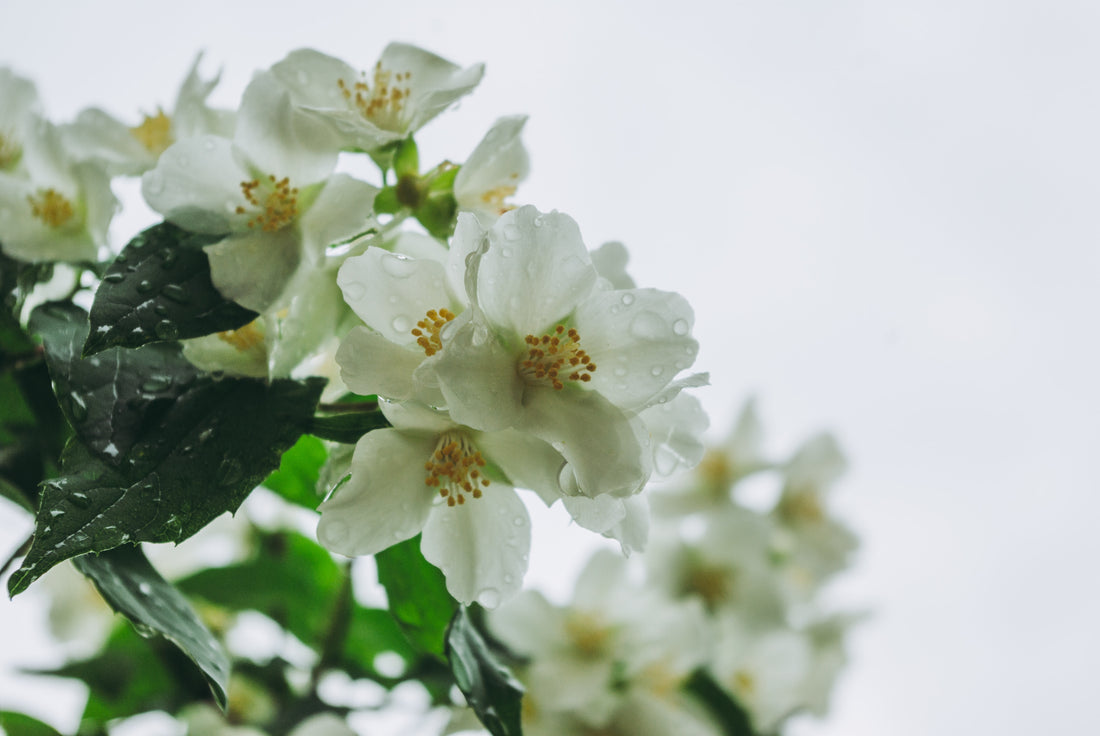What is Jasmine Essential Oil made of?
Jasmine Essential Oil is extracted from the flowers of Jasmine (Jasminum officinale), a plant native to Iran, but now grown in various parts of Asia, Europe, and Africa.
The beneficial properties of Jasmine Essential Oil can be attributed to its primary compounds like benzyl acetate, linalool, and indole, which contribute to its sweet and romantic aroma, and also provide its uplifting and calming effects.
- Latin Name: Jasminum officinale
- Main Country of Origin: India
- Scent Note Type: Base note with a sweet, floral, and exotic aroma
- Most Popular Usage: Perfumery and Aromatherapy
What are the benefits of using Jasmine Essential oil?
Jasmine Essential Oil offers a myriad of potential benefits:
- Mood Lifter: It can help uplift spirits and alleviate symptoms of depression.
- Relaxant: It promotes relaxation and may help with insomnia.
- Aphrodisiac: Its sensual scent can enhance feelings of romance and attraction.
- Skin Health: It may improve skin elasticity and help reduce the appearance of scars.
How to use Jasmine Essential Oil?
- Aromatherapy: Add a few drops to a diffuser to create a relaxing and romantic atmosphere in your home or office.
- Topical Treatment: Mix it with a carrier oil and apply it to your skin to help improve skin health.
- Perfumery: Its sweet and floral scent makes it a popular choice in perfumes and scented candles.
How to combine Jasmine Essential Oil with Carrier Oils
Jasmine essential oil blends well with carrier oils like jojoba oil, coconut oil, and almond oil. Combine 2-3 drops of Jasmine Essential Oil with a tablespoon of your chosen carrier oil for topical application.For a calming diffuser blend, add 4-5 drops of Jasmine Essential Oil to the recommended amount of water in your diffuser.
Research based on Jasmine Essential Oil
"Jasmine Absolute: Fragrance of Night, Molecules of Delight" (2019, Frontiersin.org): The study discusses the therapeutic properties of jasmine, including its role in promoting relaxation and alleviating depression.
"Sedative effects of the jasmine tea odor and (R)-(-)-linalool, one of its major odor components, on autonomic nerve activity and mood states" (2005, ncbi.nlm.nih.gov): The research suggests that jasmine and its primary component, linalool, can have a positive impact on mood and may provide a calming effect.
"Jasminum Officinale - A Review on Morphology, Phytochemistry, and Pharmacological Aspects" (2019, ncbi.nlm.nih.gov): This study covers a comprehensive overview of Jasmine, including its benefits for skincare.
Frequently Asked Questions
Q: Is Jasmine Essential Oil safe for all skin types?
A: Yes, but it should always be diluted with a carrier oil. A patch test is recommended for those with sensitive skin.
Q: Can I ingest Jasmine Essential Oil?
A: No, Avivni's Jasmine Essential Oil is intended for aromatic and topical use only.
Q: Is Jasmine Essential Oil safe for pets?
A: Cats and dogs are very sensitive to essential oils and many are even harmful or poisonous to them. Diffusers for aromatherapy should be placed high up and not near food and water bowls. There are products especially formulated for pets that have been vetted for safety and diluted to the appropriate strength and we suggest you stick with these. We recommend always checking with a holistic veterinarian before using an essential oil product on your pet.
Q: Can Jasmine Essential Oil be used during pregnancy?
A: Pregnant women should always consult with a healthcare provider before using any essential oils.
Q: Does Jasmine Essential Oil have a shelf life?
A: Yes, it's best to use it within 3-4 years of opening.

